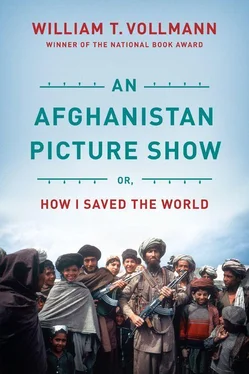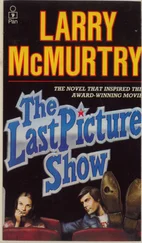(4) “If I wanted to help a woman I would not rape her.” —This, too, shows a fundamental misunderstanding. I must take photographs of Afghan women. Otherwise, American women might think that Afghans are sexist (wouldn’t that be wrong?) and not want to help them. American men would be disappointed at not having the above-mentioned exotic faces and tits to comment on. — Fair enough. — I explain my requirement to the administrator of the camp, a very obliging Pakistani gentleman. — “I understand, sir,” he tells me. “I get some women for you.” —He turns to the refugees and explains. Voices rise, but he does what he has to do; he yells at them; the voices become more excited and angry than ever; he lifts his arms firmly, shouts the Afghans down, reaches out, pushes away a boy, and points to a woman, whose baby on her shoulder turns its head, sees me, and starts to cry. The woman crouches miserably in the sand like a dark bird. Her husband comes forward, balling his fists at me, and the administrator puts a hand on his chest and pushes him back. He stands there looking at me. We are surrounded by people — the woman, the administrator and I — all of them standing and looking at me. The administrator speaks to the woman rapidly and fiercely. Everyone is murmuring and watching my face. The woman removes her veil. She will not look at me. I see her cheeks, her mouth. Her unbound hair. I move to one side and raise my camera. I believe I am taking good pictures. — Afterward, the administrator goes to speak with her husband, who finally comes forward. —“Dera miraboni,” he says to me. Thank you very much. — We shake hands.
(5) In proposing to help the Afghans, I must accept the postulate that it is better for people to be exploited by their neighbors than by strangers. I cannot prove this.
(6) Nor is it fair to claim that the atrocities currently committed by the Soviets represent what would be an ongoing situation once the resistance movement was wiped out. Surviving Afghans would probably be forced into a more equitable system of distribution than currently exists. The women would receive as much food (or as little) as the men, we might hope.
(7) “But this would mean destroying the indigenous culture.” —After x years of Soviet rule, it would be the indigenous culture. Surely the current culture of Afghanistan displaced an earlier one. There is thus no need for action. Anyway, what does being indigenous have to do with whether a culture is “good” or “bad”?
(8) “But isn’t inaction in situations of human suffering even worse than making the wrong decision?” —Oh, I don’t know about that.
(9) If the Soviets took over the world, humanity would become more homogeneous. It seems that heterogeneity is one of the principal causes of strife: the conclusion must be that every new school of fish that Leviathan swallows extends by so much the dominions of peace. Of course, the process of mastication and digestion is a little painful, but ah! after that, each glob of excrement will be like every other; and Afghanistan, Bulgaria, Czechoslovakia, and perhaps (if Fate smiles its wide, toothy smile at us) we ourselves will all be one mass of tranquillity and quietude.
(10) Besides, nobody else is interested in Afghanistan.
HELPLESSNESS [6]
At the far end of the park which the General had arranged to be built was an Afghan camp. On the Young Man’s evening walks with the General and the Brigadier, he saw a man bent down, carefully going through the grass to find twigs and thick stalks to burn. A polite distance beyond, women were collecting dung to add to the fuel.
“They would stop it if anyone asked them,” the General said. “But they have such a miserable life, poor chaps — nobody would ask them.”
There was a lovely purple sunset on the mountains, along which ran the Durand Line dividing Pakistan from Afghanistan.
The next day he walked over to see the camp. It was a hot morning, so hot that he became violently sick. Children were swimming in the big canal, in which, from time to time, excrements came cruising along. The women were washing their pots in that water. As the Young Man walked along the edge of the canal, boys waved at him and begged him to take their picture. He raised his camera. At once they formed two rows, smiling and extending their hands. When the shutter clicked, they bowed to him and hugged each other for happiness.
The camp extended for a long way. A man came up to him and showed him around. Now indeed helplessness was the Young Man’s leader, in the person of this man who strode ahead of him along the wall of the canal, brown heels lifting in white sandals; over his head, to keep off the sun, he wore a kerchief that resembled nothing so much as a red-and-white-checked tablecloth, and his baggy shirt and trousers hung limp in the breezeless air as he went on toward the wrinkled dirty tents between which little children toddled silently in the sand, toward the cornfields that did not belong to him, but in the canal a naked girl of three or four stood rubbing her belly and sucking her fingers; seeing the Young Man come, however, she rushed to squat down in the dirty water to cover herself. — Some of the families lived in tents, some in wretched grass-grown houses of earth. They all bowed or nodded to him: He could help them. §It was still Ramazan, and their lips were cracked with the heat and the dryness, but they offered him tea. Guilty and ashamed, the Young Man refused. — Another little girl was running naked along the side of the canal. When she saw the foreigner she jumped into the water. Something gray and bloody floated by her and snagged itself in her hair.
As he came to a great cornfield (owned by Pakistanis), he found a dozing water buffalo blocking his way. He stood there for a minute, wondering what to do. Children ran up and slapped and pulled at the beast until it finally yawned and got up. As he walked on, they followed him. Presently they came to a mullah with sky-blue eyes and a white beard. The children stopped respectfully. The mullah took the Young Man’s face in his hands and looked at him for a while, then stepped back. — “Peace be upon you,” the Young Man said. — “And upon you, peace,” said the mullah. He stood there smiling and nodding after the Young Man…
WITH HIS CHARACTERISTIC RESOLVE
So the refugees were not well off. At least, they were not as well off as he was. Well, what should be done about it? (Whether it could or would be done did not yet concern him, for the Young Man was methodical.
Before all else he must draw up his IDEAL PLAN. Then, if he had time, he would implement it.) So he would analyze; he would data-pick and wool-gather; he would take new batteries from their plastic bag in his camera pack; he would insert them plus to minus into his tape recorder in preparation for
The interviews
The first thing to draw in one’s IDEAL PLAN is the Overall Picture, the theme, the constellation of significant data points, one, two, three like the three children whose father had been executed by the Roos , standing in the coolness between mud-straw walls, a big girl, a little girl and a boy in between. The girls wore red dresses with gorgeous patterns. They stood squinting at the Young Man with slightly averted heads. The youngest girl’s face was very dirty. The boy stared straight at the Young Man, his hand, half balled up, thrust before him. In the darkness behind the children, the grandmother was making green chai in the Young Man’s honor. The children looked at him shyly, curiously; and there was something else in their look as well that he would never understand. It was not hostility or anything like that. It had nothing to do with him. It had to do with something that had happened. — Next you must obtain a few random points that deviate enough from your curve to add the human interest of uniqueness, but not enough to make it look as if the curve was arbitrary. After that, history becomes an organic whole, susceptible to genteel understatements about human suffering and crisp recommendations toward the alleviation of aberrant conditions.
Читать дальше












